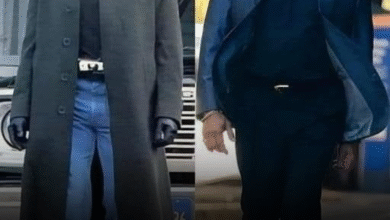Arnold Schwarzenegger Opens Up About His Most Nightmarish Childhood Experiences
OPINION: This article may contain commentary which reflects the author's opinion.
Arnold Schwarzenegger’s rise from a young boy in post-war Austria to a global icon in bodybuilding, acting, and politics is nothing short of extraordinary. However, beneath the glitz and glamour of his Hollywood success lies a childhood marked by hardship, fear, and abuse. Born in 1947 in Thal, Austria, Schwarzenegger’s early years were shaped by a tumultuous household environment, one that would deeply influence his views on success, discipline, and resilience. His most terrifying childhood memories, as revealed through various interviews and autobiographies, are rooted in the physical and emotional abuse he endured at the hands of his father, Gustav Schwarzenegger, a strict and cruel figure who left a lasting imprint on Arnold’s life.
A Strict, Post-War Austria
Schwarzenegger’s early life was set against the backdrop of a country still recovering from the aftermath of World War II. His father, Gustav, was a local police chief and a veteran of the war, whose experiences undoubtedly shaped his harsh and authoritarian demeanor. Born into an environment defined by the rigid values of the “German-Austrian mentality,” Arnold’s childhood was governed by a strict code of conformity and discipline, leaving little room for individuality or emotional expression.
Gustav’s influence loomed large over the family, and his approach to parenting was harsh, shaped by a belief in tough love that often veered into abuse. His behavior, rooted in his own upbringing and trauma from the war, was cold and unforgiving. As Arnold would later reflect, the atmosphere in the household was one of constant fear and intimidation.
Physical and Emotional Abuse
Arnold has spoken openly about the physical and emotional abuse he suffered under his father’s rule. In a revealing 2004 interview with Fortune magazine, Schwarzenegger described his experiences in terms that would now be considered child abuse. He recalled being struck with belts and having his hair pulled—punishments that were common in that era, but which nonetheless left lasting scars. He also described the emotional weight of constantly being judged and criticized by his father, whose approval seemed unattainable.
One of the most striking aspects of his childhood was the intense physical demands placed on him. The People article details how Arnold’s daily routine involved fetching water and chopping firewood in the harsh Austrian winter, with no sympathy from his father, who saw such tasks as trivial compared to his own wartime experiences. However, the most extreme aspect of Arnold’s upbringing was his father’s morning ritual, where Arnold was forced to do 200 knee bends on an empty stomach before he could eat breakfast. This grueling exercise, designed to “earn” his meal, was just one of many punishments that contributed to Arnold’s feelings of fear and resentment toward his father.
Psychological Abuse and Family Dynamics
Beyond the physical violence, the psychological abuse that Arnold experienced was equally harrowing. Gustav’s behavior often verged on the delusional, with unfounded suspicions that Arnold might not be his biological son, as noted in an EL PAÍS article. This suspicion, combined with Gustav’s belief that Arnold was gay, created an atmosphere of constant uncertainty and pressure. In these moments, Arnold found himself competing with his brother Meinhard for their father’s affection, often to no avail. One anecdote shared in the People article describes a soccer game that Arnold lost, which led Gustav to dismiss his son entirely, reinforcing the idea that nothing Arnold did would ever be good enough.
This emotional turbulence was compounded by the pervasive atmosphere of Nazi sympathies in the household, which further heightened the oppressive environment. Gustav’s unwavering belief in authoritarianism and control seemed to bleed into every aspect of family life, casting a long shadow over Arnold’s formative years.
The Duality of Love and Fear
Despite the extreme abuse, Arnold has reflected on his childhood with a sense of complexity, acknowledging both the terror and moments of affection that were also present. In the People article, he confesses that despite everything, he has “always fond memories of my dad,” suggesting that his father’s actions were in part driven by his own traumatic past. Arnold has remarked that he believed his father did not have the emotional tools to parent differently, and that his behavior was a product of his own harsh upbringing and lack of better knowledge.
This duality—of fear mixed with love—speaks to the complicated nature of Arnold’s relationship with his father. While the abuse was undoubtedly terrifying and formative, Arnold’s ability to reflect on the positive aspects of their relationship hints at the human tendency to reconcile painful memories with the good that might have existed alongside them. Gustav, despite his cruelty, did occasionally show signs of affection, such as buying Arnold ice cream after particularly brutal episodes. These brief gestures of love, however fleeting, seem to have created a profound emotional conflict in Arnold, one that he would spend years trying to understand and process.
Conclusion: The Impact of Childhood on a Legendary Career
Arnold Schwarzenegger’s most terrifying childhood memories are deeply tied to the physical and emotional abuse he suffered under his father’s oppressive rule. These experiences, marked by harsh routines, physical punishment, and psychological abuse, shaped his worldview and were pivotal in driving him to succeed and escape the confines of his upbringing.
Arnold’s reflections on his childhood reveal a complicated, nuanced relationship with his father, one that blends moments of terror with the occasional flicker of love. His ability to reconcile these two aspects of his early life speaks to his resilience and his capacity to overcome the horrors of his past.
Ultimately, the trauma Arnold endured as a child propelled him toward greatness, driving his desire to escape and prove himself to the world. His success, both as a bodybuilder and as a Hollywood superstar, was not just a testament to his physical abilities, but to his ability to overcome his painful history and transform it into a story of triumph.



